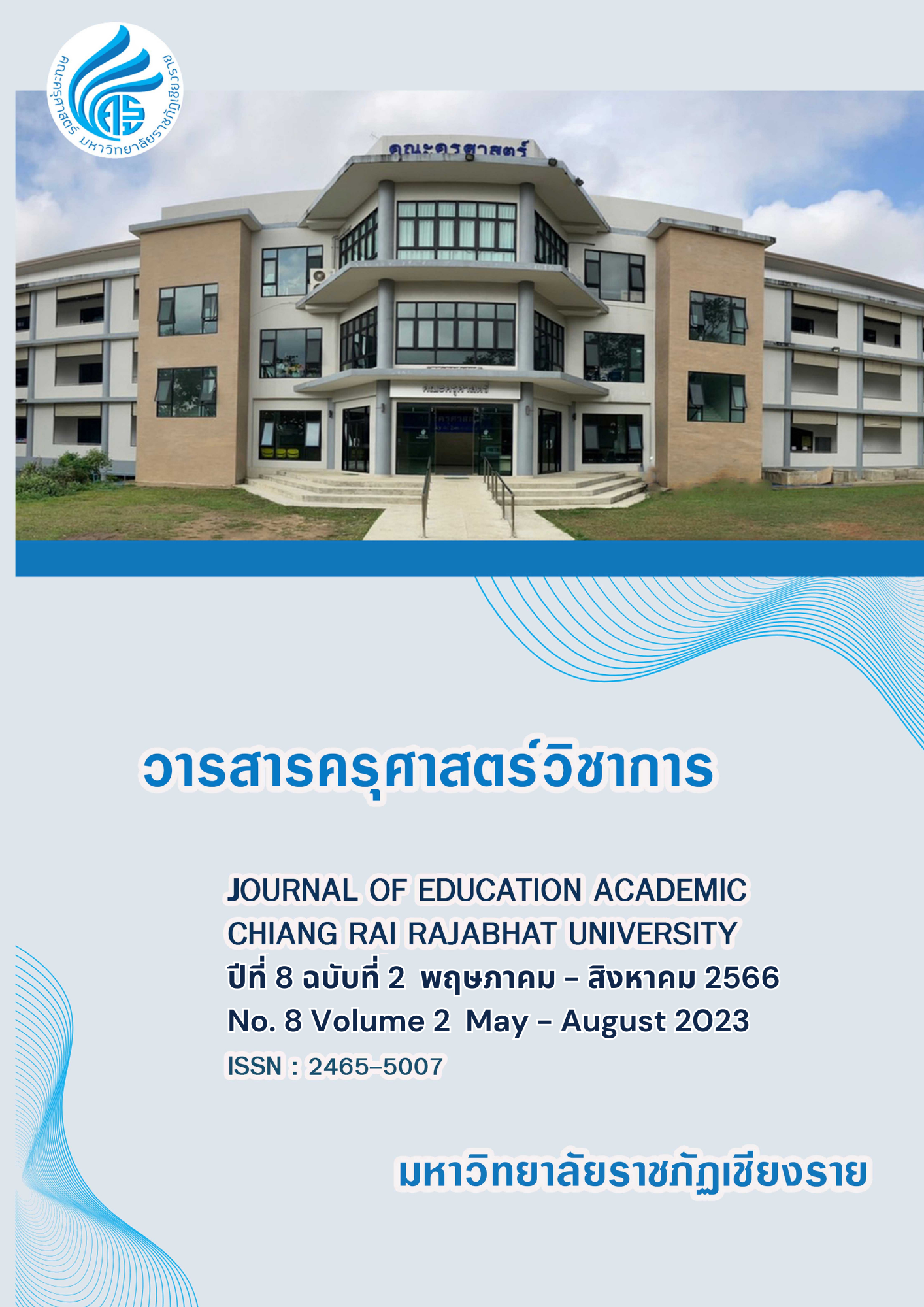The Strategies for Curriculum Management of the Studies of Social, Religion and Culture Area for Learning Management and Developing learners' 21st century skills: A case study of Ban Kuan Dong School, Phayao Province, Primary Educational Service Area Phayao 2
Keywords:
Management Strategy 21st Century, Skills for Learners Curriculum Management, Social Studies Learning Curriculum Religion and CultureAbstract
The purpose of this study was to develop strategies for curriculum management in the social studies learning subject to develop learners' 21st century skills, used participatory action planning. Participants in the meeting and informants were school administrators. Teacher who teaches the subject of social studies Course Management Committee and head of academic department Analyze data by analyzing key content and summarizing the descriptive content in an essay. The results of the study revealed that
Strategies for curriculum management in social studies subject To develop learners' 21st century skills, requires an assessment of the situation. vision, mission, objectives, strategic issues and setting up a project plan 3 aspects of the strategy were identified: 1. Student quality 2. Administration process and curriculum management 3. Teaching management that focus on the students is important This led to the determination of the project plan for all 14 strategies. 1: Develop learners to achieve learning achievement in Social Studies according to the goals 2: set by educational institutions in line with educational management in the 21th century. 3: Improve communication. 4: Develop a student-centered teaching for students to have learning skills in the 21st century 5: Develop a management system of education management. 6: Develop a service environment conducive to learning. 7: Improve the social studies learning curriculum. 8: Develop the internal quality assurance system of educational. 9: Promote teachers to be Develop a body of knowledge in school curricula. 10: Promote the use of technology in teaching. There is a thorough examination 11: Encourage teachers to receive training. 12: Develop teacher quality to have the ability to provide teaching for students. 13: Improve organizational culture for educational. 14: Develop the quality of teachers to provide teaching to create core competencies for learners in the 21st century.
References
กฎกระทรวงว่าด้วยการประกันคุณภาพการศึกษา พ.ศ. 2561. (2561). ราชกิจจาณุเบกษา.
เล่มที่ 135 ตอนที่11 ก, น. 3 - 4.
กระทรวงศึกษาธิการ. (2546). พระราชบัญญัติการศึกษาแห่งชาติพุทธศักราช 2542 แก้ไขเพิ่มเติม (ฉบับที่ 2) พุทธศักราช 2545. กรุงเทพมหานคร: กระทรวงฯ.
. (2551). หลักสูตรแกนกลางการศึกษาขั้นพื้นฐาน พุทธศักราช 2551. กรุงเทพมหานคร: กระทรวงฯ.
จิรารัตน์ กระจ่างดี. (2562). การศึกษากลยุทธ์การบริหารงานวิชาการของโรงเรียนขยายโอกาสในอำเภอขุนยวมจังหวัดแม่ฮ่องสอน. สาขาวิชาการบริหารการศึกษา บัณฑิตวิทยาลัย มหาวิทยาลัยราชภัฏเชียงใหม่.
ธีระเกียรติ เจริญเศรษฐศิลป์. (2561). การศึกษาไทย 4.0 ในบริบทการจัดการศึกษา เพื่อการพัฒนาที่ยั่งยืน. กรุงเทพมหานคร: ศูนย์ประชุมวายุภักษ์ โรงแรมเซ็นทรา ศูนย์ราชการและคอนเวนชันเซ็น เตอร์แจ้งวัฒนะ.
ประเวศ เวชชะ. (2559). การบริหารหลักสูตร การสอน การวัดและประเมินผลการเรียนรู้. เชียงราย: มหาวิทยาลัยราชภัฏเชียงราย.
. (2562). การบริหารหลักสูตร การสอน การวัดและประเมินผลการเรียนรู้. (พิมพ์ครั้งที่ 5). เชียงราย: มหาวิทยาลัยราชภัฏเชียงราย
.(2563). เอกสารคำสอน การบริหารหลักสูตร การสอน การวัดและประเมินผลการเรียนรู้. เชียงราย: มหาวิทยาลัยราชภัฏเชียงราย.
ปรีดี นุกุลสมปรารถนา. (2563). รู้จักประเภทของกิจกรรมเพื่อสังคม (CSR). สืบค้นเมื่อ
ธันวาคม 2565. เข้าถึงได้จาก https://www.popticles.com/branding/types-of-csr/.
โรงเรียนบ้านควรดง (2563). รายงานการประเมินตนเอง (SAR) , แผนพัฒนาตนเองของโรงเรียนบ้านควรดง. จังหวัดพะเยา. โรงเรียนบ้านควรดง.
สงกรานต์ เรืองประทีป. (2559). การบริหารหลักสูตรสถานศึกษาโรงเรียนสังกัดสำนักงานเขตพื้นที่การศึกษามัธยมศึกษา เขต 4. (วิทยานิพนธ์ศึกษาศาสตรมหาบัณฑิต). มหาวิทยาลัยเทคโนโลยีราชมงคลธัญบุรี. ปทุมธานี.
สำนักงานคณะกรรมการการศึกษาขั้นพื้นฐาน กระทรวงศึกษาธิการ. (2560). ตัวชี้วัดและสาระการเรียนรู้แกนกลาง กลุ่มสาระการเรียนรู้คณิตศาสตร์ (ฉบับปรับปรุง พ.ศ. 2560) ตามหลักสูตรแกนกลางการศึกษาขั้นพื้นฐาน พุทธศักราช 2551 2560. สืบค้นเมื่อ
ธันวาคม 2565. เข้าถึงได้จาก https://drive.google.com/file/d/1F4_wAe-ZF13-WhvnEAupXNiWchvpcQKW/view
สำนักวิชาการและมาตรฐาน สำนักงานคณะกรรมการการศึกษาขั้นพื้นฐาน. (2552). หลักสูตรแกนกลางการศึกษาขั้นพื้นฐาน พุทธศักราช 2551. กรุงเทพมหานคร: สำนักงานฯ.
สำนักวิชาการและมาตรฐานการศึกษา สำนักงานคณะกรรมการการศึกษาขั้นพื้นฐานกระทรวงศึกษาธิการ. (2553). แนวทางการบริหารจัดการหลักสูตรตามหลักสูตรแกนกลางการศึกษาขั้นพื้นฐาน พุทธศักราช 2550. กรุงเทพมหานคร: สำนักงานฯ.
สำนักวิชาการและมาตรฐานการศึกษา. (2561). หลักสูตรแกนกลางการศึกษาขั้นพื้นฐาน พุทธศักราช 2551 และมาตรฐานการเรียนรู้และตัวชี้วัดฯ (ฉบับปรับปรุง พ.ศ. 2560). กรุงเทพมหานคร: สำนักงานฯ.
สุวิธิดา จรุงเกียรติกุล. (2561). แนวโน้มการเสริมสร้างทักษะการเรียนรู้ในศตวรรษที่ 21,
การเรียนรู้ของผู้ใหญ่. วารสารอิเล็กทรอนิกส์ทางการศึกษา. คณะครุศาสตร์ จุฬาลงกรณ์มหาวิทยาลัย.
ศุภวิชญ์ ไชยมงคล. (2562). การพัฒนายุทธศาสตร์การบริหารและการจัดการหลักสูตร กลุ่มสาระการเรียนรู้ภาษาไทย ระดับชั้นมัธยมศึกษาตอนต้น ที่สอดคล้องกับการศึกษาไทย 4.0 ของโรงเรียนผ่านศึกสงเคราะห์ 2. (การศึกษาอิสระครุศาสตรมหาบัณฑิต). มหาวิทยาลัยราชภัฏเชียงราย. เชียงราย.
Parsons, W.. (1996). Crisis Management. Career Development International, 1, 26-28.
Downloads
Published
Issue
Section
License
Copyright (c) 2023 Journal of Education Academic Chiang Rai Rajabhat University

This work is licensed under a Creative Commons Attribution-NonCommercial-NoDerivatives 4.0 International License.






